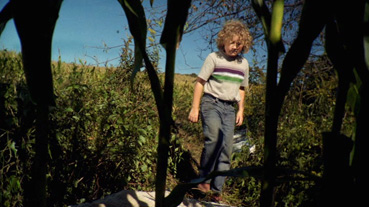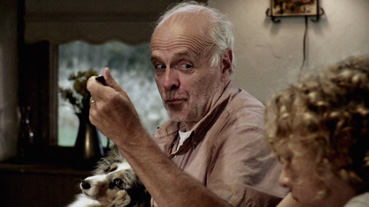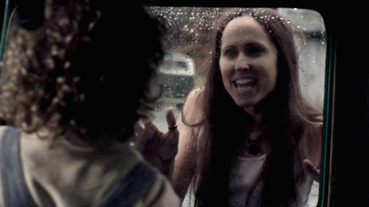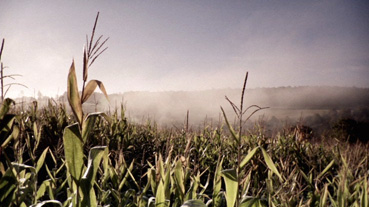|
In 1984, a film adaptation of Stephen King's Children of the Corn proved rather popular with horror fans. I certainly had a soft spot for it at the time. A few years later, most were dismissing it as another half-arsed King adaptation and claiming they'd never liked it in the first place. Then in 2009, a new TV movie version appeared and suddenly the 1984 version wasn't looking so bad after all. But even those of us who admitted liking it have continued to wonder if anyone would make a film that really exploited the creepy potential of gargantuan, all-engulfing fields of towering corn and who or what may walk behind the rows. I had no reason to suspect that The Fields, the confident second feature from The 4th Dimension directors Tom Mattera and David Mazzoni, might be the movie I've been waiting for. And in some ways it isn't. But there are plenty of times when it comes pretty damned close.
Not everyone, I should point out, has been so enthusiastic. Some, particularly those who like their horror served with machine gun pacing and sledgehammer subtlety, thought it too slow and uneventful. Others complained that it plays more like a drama than a horror film, which to a degree it does. The grumble thus seems to be that it doesn't do what it seems to be promising on the tin, a tin the filmmakers probably had no say in the design of. That misleading UK video cover doesn't exactly help. Take it from me, there are no hooded figures wandering the fields with scythes, at least not in the century in which this film is set. Fortunately for me, I went in with no expectations. I didn't know the title and it went straight to video just about everywhere, despite winning a couple of festival awards. And it really does deserve better.

My hopes were raised at an early stage. It's 1973, and round-faced young Steven (a rather likeable Joshua Ormond) is woken late at night by the sound of his parents loudly bickering, and it's clearly not the first time that this has happened. When he wanders downstairs to investigate, he sees a gun being levelled at his mother's face. Fade out to the next morning and Steven is sitting nonchalantly on the porch swing when a car we saw driving at some speed last night rolls up outside the house. A rotund and elderly sheriff walks onto the porch and tells Steven go inside with his mother. Steven refers to him as Grandpa Ray. When the car's driver, Barry (a rather good Faust Checho), walks up to the house, Roe outlines the dire consequences that will befall him should he ever point a gun at his daughter again. Cut to Steven's mother Bonnie (Tara Reid), who is preparing to take her son to stay with Barry's parents while she and hubby try to work things out. She's chosen to leave him there, she tells her own mother to her face, because he'll probably be molested again if her leaves him with her.
In the space of just a few minutes we've been introduced to three of the key characters and learned a good deal about what lies behind the family's dysfunction. None of it plays like forced exposition and some is slipped so subtly into the conversation that I only picked up on it second time around. The next couple of scenes are equally revealing, and save for the technically swish shot that runs under the title sequence, there's no look-at-me camerawork or attention-deficit editing. This is old school filmmaking, low-key in its handling, unforced in its pacing and economical in its storytelling and character building.
When Bonnie and Steven arrive at the remotely located farm owned by Barry's parents, we get to meet the film's two most enjoyable characters. Cloris Leachman is a hoot as perennially crotchety and foul-mouthed Grandma Gladys, warning Steven of the dangers of wandering into the corn by revealing how he'd look by the time they found him ("all dead and black and swollen and smelly...") and irritably snapping at her barking dogs to "shut the fuck up!" But the real find here is relative unknown Bev Appleton as Grandpa Hiney. His close bond with Steven feels touchingly real, while his unforced tomfoolery – whether is be mischievously feeding the dogs at the table (the conspiratorial looks he throws Steven here are lovely) or slyly goofing around with his false teeth – is as convincingly natural as it is entertaining.

It's shortly after this that we get our the first signs that this drama may actually be tinged with horror. Against Pappy's advice, Steven wanders into the corn and eventually emerges into a sunlit clearing, where the investigation of a number of discarded objects eventually leads him to the body of a teenage girl. As is the way with kids in horror movies, the adults don't take his claims that seriously. His imagination is running away with him, they figure, the result of his love affair with Godzilla and late nights watching horror movies with Grandma Gladys. Yet a short while later we see girl's picture on a missing person poster at the local store. There's clearly something strange out there in the corn, something that can take an unbroken walk right on to the roof of their house to peer into Steven's upstairs bedroom window.
Elsewhere the film plays with genre-fed preconceptions. A creepy farmhand named Eugene is quickly revealed to be an old acquaintance of the family and has known Steven for years. Later, when visiting mentally handicapped Aunt Gracie with his grandparents, Steven wanders into the dingy basement to find two half-wild men and a facially disfigured woman excitedly chasing and slaughtering a chicken. Against all expectations they enthusiastically greet Steven by name and recall the days when his father lived there too. All of this makes it nigh-on impossible to label something as threatening simply because it differs from the standard movie concept of normal. Here everyone and everything, no matter how oddball or otherwise, has the potential to be either friend or foe. This boundary-blurring also effects how we view the small party of hippies who are camping behind the milk farm, whose friendliness towards Steven is leant a menacing edge by radio reports on the activities of the Charles Manson Family, stories that Steven has become haunted by.

It's in this intriguing first half, where the unspecified threat lingers tantalisingly on the fringe of what we see and comprehend, that the film is at its most slyly seductive. The enigma slips a tad when a second trip into the cornfield leads Steven to the remains of a long-abandoned carnival. It's a creepy enough sequence, from the stark Spirited Away-like environmental shift to the floating Steadicam that prowls after Steven as he investigates an abandoned building. It's just that old deserted carnivals have become a bit of a horror staple, and soon after we get there I began to suspect that Mattera and Mazzoni were directly referencing Heck Harvey's Carnival of Souls, which just happens to be one of the films that Grandma Gladys watches on late-night TV. Later, we move onto even more familiar ground when the farmhouse comes under physical attack by invisible assailants, though our by-then solid engagement with the vulnerable occupants ensures that these scenes are appropriately tense.
This slow drift from the enigmatically strange into more conventional territory peaks in the climactic scenes and concludes with an element that has become the thematic raison d'être of a few too many modern genre works.* I was also uncertain by then whether I was supposed to read what had gone before in literal or metaphorical terms. Had I just watched an encounter with supernatural forces or a symbolic journey through a troubled young boy's anxieties and fears?
But for the most part The Fields is a smartly made (Daniel Watchulonis's discomfortingly moody HD cinematography deserves a special mention here) and impressively low-key exercise in slow-burn suggestive horror, a character-focussed work that challenges a few generic preconceptions and makes unsettling and atmospheric use of its period and locations. And despite the not wholly satisfying resolution, this is one corn field I would still be quite comfortable staying the hell away from.
According to the IMDb tech specs (and I've not been able to confirm this one way or the other), The Fields was shot on a Sony EX1 camcorder, which is capable of producing impressive results for a machine you can buy outright for under £6,000. That's certainly visible in the tones and colours of Daniel Watchulonis' fine cinematography; black levels are crisp, the detail is very good and the tonal range consistently pleasing. There's no doubt that the transfer looks at its best on sunlit exteriors, which are often vibrant, but even when the light drops the detail remains clear. Digital grain is visible in all lighting conditions, though is generally more prominent in darker scenes, and there is some artefacting on skies and other low detail graduations or areas of single colour.

Dolby 2.0 stereo or Dolby 5.1 surround? They're often hard to tell apart, but the 5.1 track is louder and fuller when the activity hots up (the assaults on the house are a good example). There is some surround work, but it's really on the subtle side and used mainly for background effects.
Not a thing. Bit of a shame, this, given the film's divergence from the horror norm in pace, style and period setting.
Horror fans who like their films to go bang from the opening scene and stay violent and pacey may well have some serious problems with what's served up here. The Fields is happy to take its sweet time, to focus on character, and to let the horror creep in quietly like rising damp. It loses its grip a little once convention takes hold, but this is still a fine little film that deserves more attention than it will probably get. The lack of extras on Arrow's disc is a bit of a let-down, but the transfer is solid and collectors will doubtless thrill at the 3D effect of the lenticular sleeve.
* I can't elaborate further without revealing the ending and spoiling things for first timers, or at least those who've not been exposed to as many genre films as I have over the years.
|